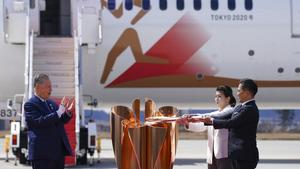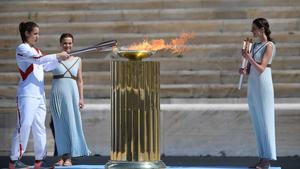Skepticism mounts among health experts, athletes
 The Tokyo 2020 Olympic flame is displayed at Ishinomaki Minamihama Tsunami Recovery Memorial Park in Ishinomaki, Miyagi prefecture on March 20, 2020, after its arrival from Greece. (CHARLY TRIBALLEAU / AFP)
The Tokyo 2020 Olympic flame is displayed at Ishinomaki Minamihama Tsunami Recovery Memorial Park in Ishinomaki, Miyagi prefecture on March 20, 2020, after its arrival from Greece. (CHARLY TRIBALLEAU / AFP)
The countdown to this summer's quadrennial sporting extravaganza entered its final stages on Friday with the arrival of the Olympic flame in Japan.
However, due to the novel coronavirus pneumonia pandemic, debate is continuing over whether the Tokyo Olympics should be held.
As of press time, no decision had been taken to suspend or cancel the Games.
ALSO READ: IOC to decide on Olympics postponement within four weeks
This is a very complex business, where you can only act responsibly if you have a reliable and clear basis for decision-making, and we monitor this every day, 24 hours a day
Thomas Bach, President, IOC
Despite growing skepticism among health experts and athletes, International Olympic Committee President Thomas Bach defended his organization's stance on Friday that the "cancelation of the Olympics is not on the agenda".
Bach said it would not be responsible to set a deadline for a decision on the Olympics, because it would be based on speculation, adding that the IOC has a task force, including the World Health Organization, which said it was too early to make such a decision.
Most organizing officials in Tokyo also feel it is too soon to make a decision to cancel the Games. The opening ceremony is scheduled for July 24.
In an earlier interview, Bach said the IOC would take advice from the WHO on whether the Games should be canceled or postponed. "It is critical that athletes from the most-affected countries and regions are given a fair chance to compete," he said.
"Cancelation would destroy the Olympic dream of 11,000 athletes from 206 National Olympic Committees and the IOC refugee team. You cannot postpone the Olympic Games like a soccer match. This is a very complex business, where you can only act responsibly if you have a reliable and clear basis for decision-making, and we monitor this every day, 24 hours a day," said Bach, a 66-year-old former Olympic fencer.
Professional athletes and coaches who have been infected include National Basketball Association players Kevin Durant and Rudy Gobert in the United States, and in the world of soccer, Daniele Rugani, a defender with Italian club Juventus, and Mikel Arteta, manager of Arsenal in the English Premier League. Kozo Tashima, vice-chairman of the Japan Olympic Committee, also tested positive on Tuesday.
A number of sports events in Japan have been canceled or postponed as the virus spreads. On March 1, the Tokyo Marathon was limited to about 200 professional runners, while national baseball games, horse racing and the Spring Grand Sumo Tournament were held behind closed doors.
Olympic qualifying events are also facing delays. China, Italy, Singapore and many other countries have announced the postponement of qualification for the swimming. FINA, the sport's international governing body, is also discussing whether to suspend major events for the next three months, including synchronized swimming and water polo qualification for the Olympics.
 Three-time Olympic gold medalists Tadahiro Nomura, right, and Saori Yoshida light the torch as Tokyo 2020 Olympics chief Yoshiro Mori, left, watches during Olympic Flame Arrival Ceremony at Japan Air Self-Defense Force Matsushima Base in Higashimatsushima in Miyagi Prefecture, north of Tokyo, March 20, 2020.
(EUGENE HOSHIKO/AP)
Three-time Olympic gold medalists Tadahiro Nomura, right, and Saori Yoshida light the torch as Tokyo 2020 Olympics chief Yoshiro Mori, left, watches during Olympic Flame Arrival Ceremony at Japan Air Self-Defense Force Matsushima Base in Higashimatsushima in Miyagi Prefecture, north of Tokyo, March 20, 2020.
(EUGENE HOSHIKO/AP)
The International Judo Federation has announced that it will suspend world ranking points, which are also used as Olympic qualification.
Some qualification is still going ahead, for now, in countries not severely affected by the outbreak, with several Chinese boxers securing their tickets to Tokyo at an event in Amman, Jordan, on March 11.
Some athletes are concerned about the lack of training during the outbreak and whether they will be able to travel to Japan to compete, as many countries have imposed quarantine measures.
USA Swimming and UK Athletics have called for the Tokyo 2020 organizers to delay the Games for 12 months.
In a statement on Friday, the Norwegian National Olympic Committee said the Games should be delayed until the pandemic is brought under control. On Saturday, the Brazilian Olympic Committee endorsed postponing the Games until next year.
In an interview with the national newspaper Asahi Shimbun, Kaori Yamaguchi, a member of the Japanese Olympic Committee board who won a bronze medal in judo at the 1988 Seoul Olympics, said, "Starting the Olympics at a time when athletes cannot train as much as they want to runs counter to the motto of 'athletes first'."
Governments have imposed health measures in the US, China, Russia, the United Kingdom, Germany, Japan, France, South Korea, Italy and Australia, the top 10 medal-winning countries at the 2016 Rio de Janeiro Olympics in Brazil.
According to some sports commentators, it is now questionable whether athletes from these countries will make it to Tokyo.
Lockdowns, quarantine measures and social distancing mean athletes and coaches will have to continue staying at home for weeks, without access to their usual training facilities and regimens. According to experts, training in the six months before the Games is crucial to athletes' performance.
Many spectators and crews required to ensure that events, infrastructure, technology and security arrangements operate smoothly will not be allowed to travel either.
The summer Olympics have never been suspended due to disease or an epidemic.
Since the first Games of the modern era were held in Athens, Greece, in 1896, the summer Olympics have been canceled three times. The 1916 Berlin Games were called off due to World War I, and the 1940 Tokyo and 1944 London Games were canceled during World War II. The 2016 Rio Olympics saw an outbreak of the Zika virus, but this was eventually contained and events went ahead.
Since Tokyo bid successfully in 2013 to host the Games, Japan has been preparing for the big day.
According to Time magazine, the preparations have cost about US$25 billion, four times the expected budget. The Japanese government has provided 120 billion yen (US$1.14 billion) to build stadiums and 30 billion yen for the Paralympics.
Wang Xingyu, an associate professor at the School of International Relations at Renmin University of China, said the Japanese government wants to use the Games to revive the country's economy, boost solidarity among its people and build a positive international image.
Wang said holding the Games as scheduled may give the Japanese authorities the hope of stimulating stagnant growth. "Japan is facing the dilemma of insufficient foreign trade and domestic demand, and greatly needs a stimulus similar to the 1964 Tokyo Olympics. Abenomics (policies advocated by Japanese Prime Minister Shinzo Abe) hopes to use the Olympics as leverage to boost the country's tourism, manufacturing and service industries to pull the nation out of a slump."
Canceling the Tokyo Olympics would cost Japan about 7.8 trillion yen in annual GDP, or 1.4 percent of the total, according to a forecast by the Sumitomo Mitsui Banking Corp.
It said the impact would include the cost of publicity, transportation and refunding tickets, as well as the cost of accommodations and the amount spent by visitors to Japan.
Some 8.8 million tickets for the Games have been sold worldwide. In line with IOC regulations, the host country can sell 75 percent of tickets domestically, with the remaining 25 percent sold overseas. Some 4.48 million tickets have been sold to Japanese nationals.
Ticket prices for the Tokyo Olympics opening ceremony range from 12,000 yen to 300,000 yen. For a specific event, such as the men's 100 meters final, prices are from 5,800 yen to 130,000 yen. Total revenue from ticket sales for the Games stands at more than 154.7 billion yen.
The Japanese government is aiming to attract 40 million tourists to the country annually.
 An athlete lights the Olympic torch during the olympic flame handover ceremony for the 2020 Tokyo Summer Olympics, on March 19, 2020 in Athens. (ARIS MESSINIS / AFP / POOL)
An athlete lights the Olympic torch during the olympic flame handover ceremony for the 2020 Tokyo Summer Olympics, on March 19, 2020 in Athens. (ARIS MESSINIS / AFP / POOL)
Last year, the number of overseas tourists to the country reached a record-high 31.88 million, having grown for eight consecutive years. If the Tokyo Olympics are held successfully, the goal of 40 million tourists may not be difficult to achieve. But if the Games are suspended, a large number of international tourists will cancel their plans to visit Japan, leading to a series of losses.
The outbreak has also affected the Japanese tourism industry. On March 2, Luminous Cruising declared bankruptcy, becoming the country's first cruise ship company to go bust due to the virus.
For the IOC, suspending the Games would mean significant losses. It has set up a fund of about $1 billion, which, in addition to hosting the Games, will go to regional, national and international sports governing bodies to fund athletes, according to the committee's website.
But the IOC's financial statements for 2013 to 2016 show that 73 percent of this amount has come from rights to broadcast the Games live, and 18 percent from sponsors, meaning that suspending the Olympics would have an unprecedented economic impact on the committee.
Seiko Hashimoto, Japan's Olympics minister, said this month during a meeting of parliament: "The IOC has the right to cancel the Games only if they are not held during 2020. This can be interpreted to mean the Games can be postponed as long as they are held during the calendar year."
Haruyuki Takahashi, a member of the Tokyo Games organizing committee, told The Wall Street Journal that a delay of one to two years may be the most realistic option.
But according to senior IOC member Dick Pound, with so many stakeholders involved, postponing the Games is not simply a matter of timing. The possibility of postponing or moving them is open to question.
First, if the Games are postponed until the end of this year, low temperatures will have an impact on the outdoor events, particularly athletics. The average temperature in Tokyo in July and August is about 23 C, while in November it drops to 16.7 C, and the minimum temperature falls below 10 C.
Moreover, the number of global sports events scheduled for the next two years will make it difficult for athletes and national teams to coordinate schedules.
In the second half of this year, the professional sporting calendar is tight. Starting in October, National Football League, college football, baseball, basketball and hockey games are due to be staged across North America. In Europe, soccer leagues will either be playing catchup with games postponed from this season, or starting a new list of fixtures.
A delay would also be a test for broadcasters, Pound said. With so many top-level sports events scheduled for the second half of this year, and with the sale of advertising slots during the Games almost guaranteed, broadcasters would be reluctant to accept any rescheduling.
"If the Tokyo Olympics were to be canceled or postponed, it would be difficult for the host country, sponsors and the IOC to bear the losses and difficulties," he added.
According to media reports, preparations for the Games are continuing smoothly.
With work on the aquatics center completed on March 6, all permanent venues for the events have now been built, the Tokyo Olympic organizing committee said, adding that the spread of the virus will not have much of an impact on preparations for the Games.
But health experts said that if Japan is still planning to host the Olympics at the end of July, parallel measures are needed for preparations and epidemic control.
Some of the experts suggested that Japan could learn from Brazil's experience. In 2016, the Zika virus spread to more than 60 countries and regions worldwide. With the WHO classifying it as a Public Health Emergency of International Concern, many calls were made for the Rio Olympics to be suspended.
The Brazilian government allocated US$126 million in emergency funding to combat the outbreak, while sending more than 200,000 troops to fight the virus nationwide.
After athletes and the media moved into their Olympic accommodations, the organizing committee for the Games regularly sprayed these areas to repel mosquitoes and prevent the Zika virus spreading.
In addition, a number of high-tech measures were used at the Games to ensure the health of athletes and visitors. One highlight was a mobile app developed to enable people to track the virus and to learn about preventive measures.
No cases of infection were reported among athletes at the Rio Olympics.
READ MORE: Clamour grows to postpone Tokyo Games
But COVID-19 is much more difficult to contain than Zika, as it is spread in a more diverse and complex way.
If the outbreak cannot be contained, the Tokyo Games organizing committee has another option - to proceed with the Games behind closed doors.
Stephen Park, British Cycling's performance director, said earlier that the IOC and the WHO had discussed plans to host the Tokyo Olympics without spectators.


